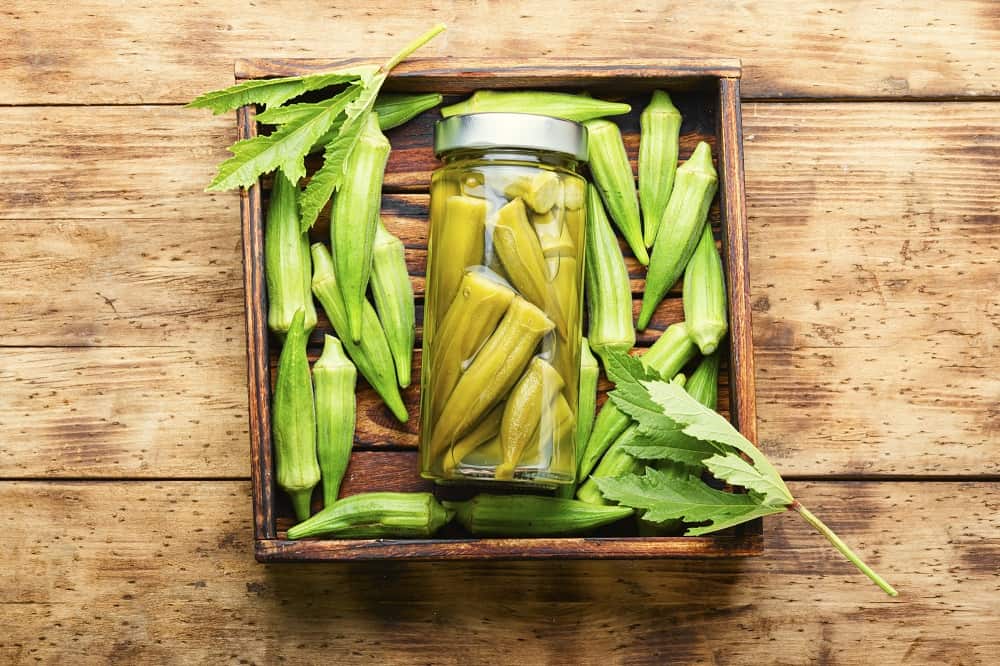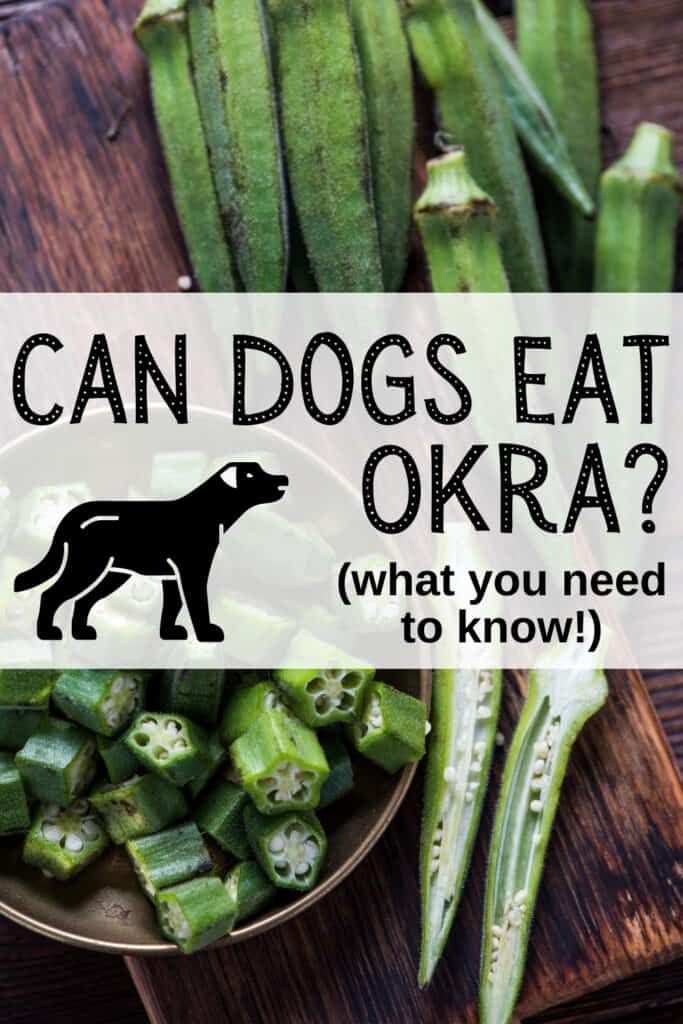If your canine companion just grabbed a bite of okra from your plate, you might be wondering – can dogs eat okra? In most cases, it is safe for dogs to have a little bit of okra. However, there are a few situations that could be unsafe.
This post was reviewed for veterinary accuracy by Cara Wright, DVM. For more information about our review process, please visit the About Us page. This article is for informational purposes only and should not be a substitute for professional veterinary help.
Consider the okra cooking method
The safety of okra for dogs depends on the way that it was prepared (in addition to the amount they ate, of course). Here’s a breakdown of which types should be safe versus which are not recommended.
Safe (in small quantities):
- Raw – While most of us wouldn’t envision munching on raw okra, it should be safe for a dog to eat in small amounts. Use smaller pods that are less fibrous, and be sure to cut it into small pieces to avoid a choking hazard.
- Steamed – In this case, the okra is just cooked over boiling water via the heat from steam. This should be safe to eat.
- Boiled – This is another safe method of cooking, however note that boiling may enhance the sliminess of okra.
- Roasted – As long as there are minimal amounts of added fats (like oils), roasted okra can be fine for dogs to eat.
- Microwaved – If you’ve got a bag of frozen okra, you might just be microwaving it. That should be fine too!
Unsafe:
- Fried – When fried, okra may contain higher amounts of unhealthy fats. Those fats – while adding delicious flavor to our food – can make your pet sick with stomach upset.
- Cooked with garlic or onions – These two ingredients are toxic for dogs.

What about pickled okra?
The safety of pickled okra depends on the ingredients in the pickling mixture and the amount the dog has eaten.
First, it’s important to ensure the pickled okra does not contain these ingredients that are toxic to dogs:
- Caraway seeds
- Onions and onion powder
- Garlic and garlic powder
Some store-bought or locally made jars of picked okra may contain ambiguous ingredients like “natural flavors and spices” – these can be difficult as you don’t know whether it contains the ingredients above.
Second, you’ll want to consider the salt content. Pickled okra is high in sodium, and too much salt is not good for your dog.
That said, it would take a lot of pickled okra to raise blood sodium levels. True hypernatremia (when blood sodium is too high) is fairly rare in dogs and more commonly associated with fluid losses or excessive intakes of extremely-high-sodium products like rock salt or homemade playdough.
If you have a small dog that ate a ton of pickled okra, it’s probably worthwhile to give a call to the veterinarian. The smaller the dog, the greater the risk, simply because it’s a greater amount of salt by weight.
Signs of too much salt can include gastrointestinal upset like vomiting and diarrhea, and further progression to hypernatremia can include depression, lethargy, tense muscles, frequent urination, seizures, or other severe symptoms.
For example, a 16-ounce container of one brand of Okra pickles contains about 4200 mg (or 4.2 grams) of sodium in the entire jar.
According to the textbook Small Animal Toxicology, signs of salt toxicity can occur as low as 2 grams per kilogram (2.2 pounds). So if you had a small dog breed that managed to scarf down half or an entire jar of those pickles, you’d want to contact a veterinarian quickly about potential salt poisoning. (Of course, it’s unlikely that many small dogs would eat that volume of pickled okra, but worth mentioning for awareness).
Regardless, even if your dog only ate small amounts of pickled okra, and even if it didn’t contain harmful seasonings, it’s also not necessarily a recommended food to feed your dog. If you’d like your dog to try okra, the safer cooking options mentioned in the section above are preferable.
Will dogs like okra?
Some dogs may not like the texture of okra, similar to humans. Okra contains mucilage, which is a thick, gelatinous substance. This is what gives okra the sometimes-slimy mouthfeel.
Because that substance is comprised of polysaccharides, heat in cooking can thicken up the mucilage and may increase that sliminess.
If you or your pup aren’t a fan of that texture, try using okra in a dish where the mucilage is actually beneficial to thicken up the recipe (like in a homemade doggie-friendly stew).
Or, you can also cook okra very quickly at high heat, which can reduce the slime factor.

Benefits of okra for dogs
There are several benefits that may come along with occasional servings of okra:
1. Antioxidants
According to a study in Food Science & Nutrition, okra – in particular, that mucilage in the pod – is a good source of natural antioxidants.
Just like in humans, antioxidants may have beneficial effects in dogs too. They protect the body’s cells from excessive oxidative stress – or in other words, help shield the cells and protect them from damage.
(Interestingly, as an aside: many dog foods on the market contain antioxidants to help protect the food itself from oxidative spoilage, keeping it shelf-stable longer.)
2. Fiber
Okra is also a good source of fiber. According to Cummings Veterinary Medicine Center at Tufts University, fiber helps promote healthy digestion and good gut health.
However, if your dog truly needs more fiber, a concentrated fiber supplement prescribed by your veterinarian will likely be a more effective option than occasional veggies from your kitchen. Talk to your vet for more guidance.
3. Vitamin K
Okra is an excellent source of Vitamin K. Similar to humans, dogs need Vitamin K for proper blood clotting.
Risks of okra for dogs
While there are benefits, there are also risks when it comes to the question of can dogs eat okra.
1. Gastrointestinal upset
If your dog eats too much okra in one sitting, they may end up with some stomach upset. This may be more likely when eating large, raw okra pods that can be more fibrous.
2. Creating dietary imbalances
No matter what table foods you’re giving to your dog – whether purposefully or accidentally! – be sure that they’re not crowding out the main nutritious meals your dog needs.
Your dog (just like you!) needs the right amount of macronutrients each day. Commercial pet foods are designed with the proper proportions of protein, fat, and carbohydrates for your dog. Homemade real-food diets can be designed similarly but require a lot of careful planning.
Avoid giving your dog too many random table foods that may throw off the balance of their diet and prevent them from getting essential amounts of nutrients like protein.
A final word from Your Dog Eats
As you can see, a few bites of most forms of okra are nothing to worry about for your pooch. However, if your dog ate a large amount of pickled or fried okra, or you’re unsure how much okra they ate even from the safer options, do call your veterinarian for individualized advice.
PS – Wondering about other vegetables? Check out this post to see if dogs can eat asparagus, or this one about dogs and spaghetti squash.


